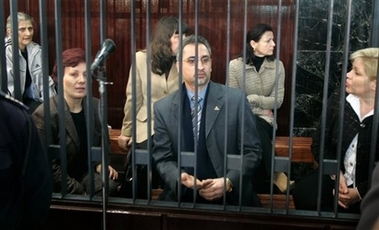Deal struck in Libya foreign medics case
(AP)Updated: 2007-07-11 10:34
TRIPOLI, Libya - A settlement has been reached to resolve the crisis over five Bulgarian nurses and a Palestinian doctor sentenced to death in Libya for allegedly infecting more than 400 children with the AIDS virus, a foundation headed by the Libyan leader's son said Tuesday.
"A settlement has been reached by the Gadhafi foundation and the League of the Libyan Children Infected with AIDS," Abdessalem said, referring to the group representing families of infected children. "This settlement is acceptable to all parties and will end the crisis," he told The Associated Press. "Details will be announced tomorrow."
The spokesman did not say whether the settlement involved financial compensation for the families, but there have been rumors for days in Libya that such an agreement was imminent.
Gadhafi had tried in the past to reach a deal by which Bulgaria would compensate the victims. But the Bulgarian government had rejected the proposal, saying it would imply the nurses' guilt.
Libyan officials have said the families' acceptance of a compensation settlement was key to resolving the legal deadlock. It would satisfy Islamic law and allow the death sentence to be withdrawn, they say.
Libya's ambassador to Britain, Mohammed al-Zaway, has said in the past that an agreement with the families would reflect positively on the case according to Islamic law. Often referred to as "blood money," compensation for death or suffering is a legal provision in the traditional Islamic code that is widespread in parts of the Middle East and North Africa.
The Gadhafi International Foundation for Charity Associations, which announced the settlement, is headed by Seif al Islam, son of longtime Libyan leader Moammar Gadhafi. Seif al Islam has become an influential figure in Gadhafi's regime and an unofficial ambassador-at-large for it. He has been active for months in trying to resolve the case of the medics.
Earlier this year, he told a Bulgarian newspaper the six had received unjust verdicts and would not be executed.
Libya is under intense international pressure to free the six, who deny infecting the children. The case has become a sticking point in Libya's attempts to rebuild ties with the United States and Europe. President Bush called on Libya last month to free the medics.
A senior aide to Bush hand-delivered a letter from the president to Gadhafi on Monday that noted, among other things, the importance of resolving the crisis over the imprisoned medics, Gordon Johndroe, a spokesman for the National Security Council, said Tuesday.
The State Department could not confirm that an agreement had been reached but said Washington "would welcome" any resolution that would free the medics.
"We believe it is time for these people to be allowed to go home to their families," said Gonzalo Gallegos, a department spokesman.
The six began working at the hospital in the city of Benghazi in 1998 and were arrested the next year after more than 400 children there contracted HIV. Fifty of the children have died.
The prosecution insists that the six infected the children intentionally in experiments to find a cure for AIDS. Defense experts testified that the children were infected by unhygienic hospital conditions. In their testimony, the workers said the confessions used by the prosecution had been extracted under torture. Several of the nurses have said they were also raped to force confessions.
The medical workers were convicted and sentenced to death in 2004, but the Supreme Court ordered a retrial after an international outcry over the verdicts.
In a ruling that shocked many in Europe, the second trial ended with the same verdict in December despite a scientific report weeks earlier saying HIV was rampant in the hospital before the six began working there.
Two Libyans - a police officer and a doctor - were put on trial on charges of torturing them and were later acquitted - which led to the six medics being put on a new trial for defamation.
They were acquitted of defamation in May, a ruling that raised hopes in Bulgaria that the main conviction and death sentences against them could be overturned by the Supreme Court.
If the Supreme Court upholds their conviction and death sentence on Wednesday, it is not necessarily the final word. When the December verdict was announced, Libya's foreign minister said a decision by the Supreme Court to uphold the sentence would go to a judicial board that could itself uphold or annul the decision.
|
|
|
||
|
||
|
|

